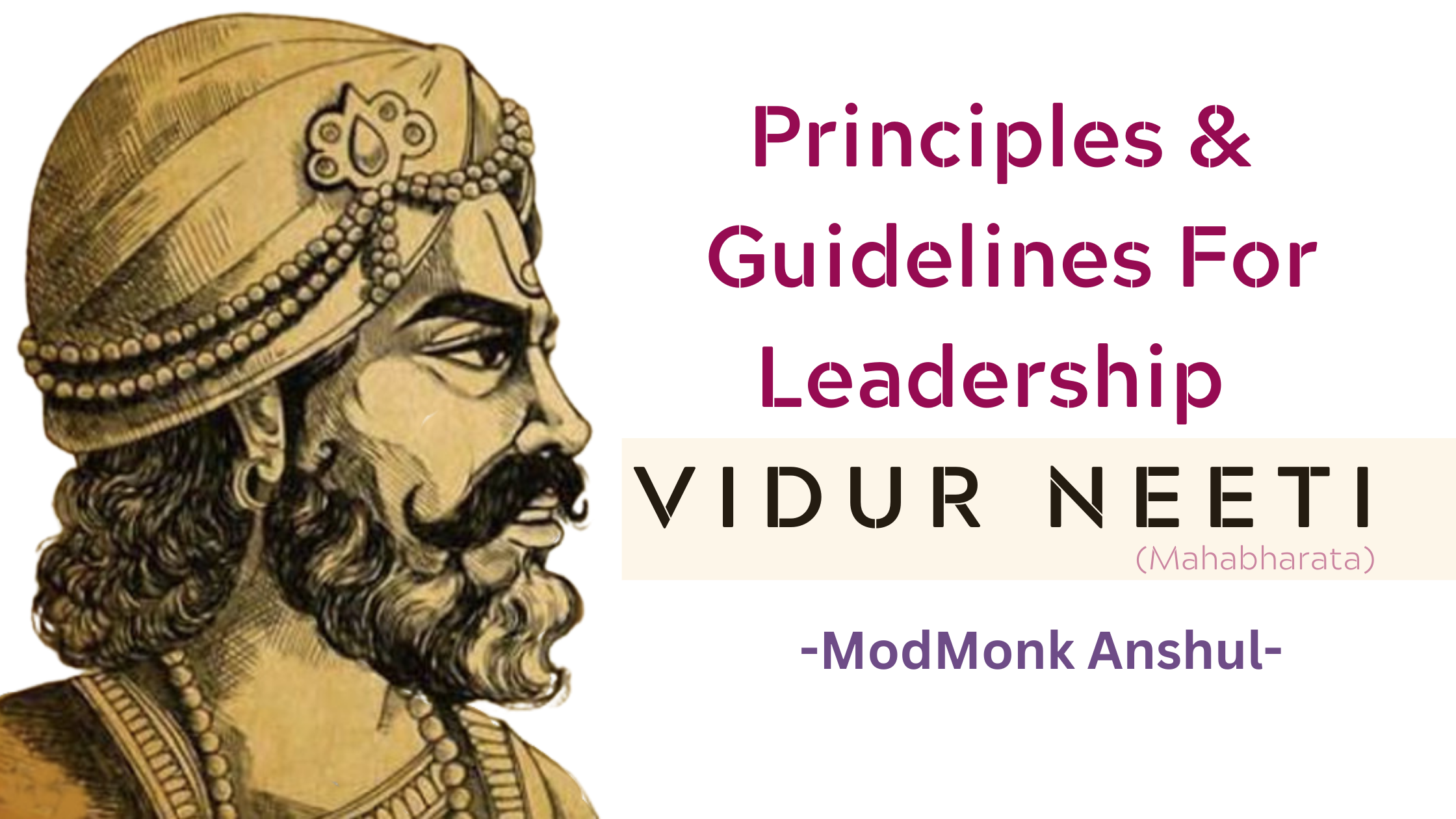Vidura, was a wise minister and advisor to the King of Hastinapur, in the history of Bharatha (India) – and mentioned in the Epic Mahabharata.
Vidura articulated these principles in Chapters 33 through 40 of “Udyoga Parva” in the Mahabharata, as a set of principles and guidelines for leadership Collectively known as Vidura Niti or Vidura’s Statecraft, they outline what wise people and leaders should do, and things they should not.
While contemporary leadership literature offers numerous theories and models, these principles have stood the test of time and continues to be relevant to leaders today in the corporate and modern life as it was thousands of years ago.
Here are some of the leadership laws to follow and incorporate them in your professional life by Vidura Neeti :
#1 Lead by example:
A leader should set an example for others to follow. In today’s corporate world, leaders must be role models, setting an example for their team members to follow. For instance, if a leader expects their team to be honest and transparent, they must first demonstrate these qualities themselves.
Vidura did not just give advice, he also followed it himself, setting an example for others to emulate. This made him a trusted advisor and a role model for leaders.
For instance, Warren Buffett & Ratan Tata , are known for their exemplary honesty and integrity, which has helped build a culture of trust and transparency within his organization.
#2 Listen to others:
Vidur understood that decisions made without considering the opinions and feedback of others could lead to disastrous consequences. When the Kuru king, Dhritarashtra, refused to give the Pandavas their rightful share, Vidur advised him to reconsider his decision and listen to the opinions of his courtiers. However, Dhritarashtra refused to listen and instead sided with his own son, Duryodhana, leading to a devastating war.
In the corporate world, leaders must listen actively, empathizes, and takes into account diverse perspectives before making any decisions. For example, when a team member expresses an innovative idea, a good leader acknowledges their contribution and engages in a discussion to explore its feasibility.
#3 Act with integrity:
Acting with integrity was also paramount in the Mahabharata, Vidura was known for his unwavering commitment to truth and righteousness, and he expected the same from the leaders he advised. His commitment to integrity was exemplified in his interactions with King Dhritarashtra, who was often swayed by his own desires and biases. Despite the king’s attempts to silence him, Vidura remained steadfast in his convictions and continued to speak truth to power.
A leader should always act with integrity, even when it is difficult. It is about doing the right thing even when no one is looking!
In today’s business environment, leaders must act with transparency, honesty, and ethical standards. This means ensuring that the organization’s actions align with its values, and that everyone in the organization is held accountable for their actions. For example, a leader who upholds integrity would not compromise on quality, even if it means delaying a product launch or missing out on profits.
#4 Be decisive:
One of the examples of Vidura’s decisiveness was when he supported the Pandavas during the game of dice. Despite the opposition of many of the other courtiers, Vidura spoke up in favor of the Pandavas and called out the unfairness of the game. He remained firm in his stance and did not waver in the face of opposition.
Being a decisive leader is crucial to keep the organization moving forward. A leader should be decisive and not hesitate to make tough decisions when necessary. However, decisions must be grounded in facts, data, and the organization’s values. For example, a leader must be prepared to make tough decisions such as downsizing, cutting costs, or changing the organizational structure in response to market demands. This helps to ensure that progress is made and that the organization stays on track.
#5 Develop your team:
A leader must empower and develop their team members to reach their full potential. This means providing training, mentoring, and coaching to help them acquire new skills and knowledge.
Vidura was instrumental in the education and training of the Pandavas and their cousin Karna. He arranged for them to receive instruction in various disciplines, including archery, politics, and philosophy. Vidura also served as a mentor and confidant to the Pandavas.
For example, a leader who invests in their team members’ development can help them take on new roles, responsibilities, and opportunities that align with their strengths and interests.
#6 Communicate effectively:
As a trusted advisor to King Dhritarashtra, Vidura was respected for his ability to convey his ideas and opinions clearly and concisely.
Effective communication is another vital law of leadership in the modern corporate world.A recent study found that organizations with highly effective communication practices are 1.5 times more likely to outperform their peers. Thus, leaders always prioritize communication, holding regular town hall meetings, and using social media to keep employees informed about the company’s progress and goals and helps to ensure that everyone is on the same page and working towards the same goals.
#7 Be adaptable:
Adaptability was a quality that Vidur highlighted in his advice as well. In ancient times, the ability to adapt was critical for survival, and it remains just as important in today’s rapidly changing world and being adaptable in the face of unexpected challenges and shifting circumstances.
In the modern world, organizations that are adaptable and able to pivot quickly are better equipped to deal with the rapid pace of change and the uncertainty that comes with it.
Example – The COVID-19 pandemic forced many businesses to adapt quickly to remote work and digital technologies, and those that were able to adapt successfully were better positioned to weather the storm.
#8 Show respect:
A leader should show respect for others, regardless of their position or background.
Showing respect was not only a moral imperative but also a practical necessity in the Mahabharata. After the gamble – Draupadi pleads with the court for help, but none of the courtiers speak up to defend her. Despite the risk to his own safety, Vidur shows respect for Draupadi and upholds the principles of justice and fairnes Vidur advises the King to treat everyone with respect, regardless of their position or background. He emphasizes that a leader should not be swayed by personal biases or prejudices and should strive to be fair and just in all their dealings. This is exemplified when Vidur advises the King to give equal treatment to all his sons, regardless of their birth order or personal preferences.
In the modern world, showing respect is important not just for building strong relationships within the organization but also for building trust with customers and stakeholders.
This means treating everyone with dignity and kindness and valuing the contributions of each team member.
#9 Take responsibility:
A good leader should take responsibility for their actions and decisions.
Vidura emphasized the importance of taking responsibility for one’s actions. In fact, he believed that a leader should be accountable for both their successes and their failures. After the war, King Yudhishthira, was plagued by guilt over the lives lost in the war, and he turned to Vidura for guidance. Vidura reminded Yudhishthira that he had taken up arms to defend his honor and his kingdom, and that he had done so with the best of intentions, also reminded Yudhishthira that he was responsible for the consequences of his actions, both good and bad. This story highlights the importance of taking responsibility for one’s actions, even in the face of difficult circumstances.
This is a lesson that remains relevant in modern times, as leaders must navigate complex challenges and make difficult decisions that affect the lives of many.
#10 Lead with humility:
A leader should lead with humility ,recognizing that no one has all the answers and that everyone can learn from others. In the modern world, leading with humility is important for building strong relationships with team members and stakeholders, as well as for creating a culture of continuous learning and improvement.
Vidura himself was known for his humility and wisdom and demonstrated his humility when he was summoned to give his opinion on a matter of state. Rather than arrogantly assume that his opinion was the only one that mattered, he first sought out the opinions of others, and only after hearing everyone out did he offer his own well-considered advice.
This kind of humble leadership is just as important in modern times as it was in the Mahabharata. Leaders who are willing to listen to others, admit their mistakes, and learn from those around them are more likely to earn the trust and respect of their team members.
They are also more likely to create a culture of openness and collaboration, where everyone feels valued and empowered to contribute their ideas and expertise.
In contrast, leaders who are arrogant and dismissive of others are more likely to create a culture of fear and mistrust, where team members feel undervalued and disengaged.
Vidur Neeti offers timeless principles and guidelines for leadership that continue to be relevant to leaders in the modern corporate world.
These leadership laws can help build a strong and effective team, make sound decisions, and achieve goals. By embodying these principles, a leader can make a lasting impact on their organisation and create a culture of excellence and integrity.
Hope you enjoyed the read, share and of course comment below!
Love,
ModMonk Anshul



One Response
This was a great read!